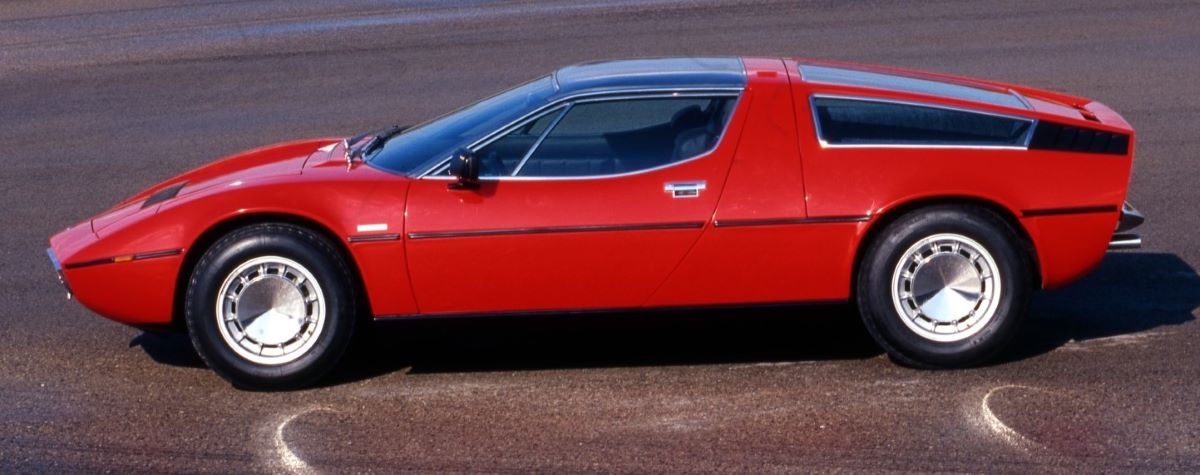
Maserati Bora 4.7 (1971 to 1978)
The Bora was Maserati’s first mid-engined road car and was introduced in March 1971 at the Geneva motor show. Powered by Maserati’s proven 4.7 liter 90° V8, mounted longitudinally, it was a true supercar which promised to fully maintain the company’s core ethos of class, comfort and refinement. Judging by the critical acclaim it received throughout this period, and still continues to generate today, it delivered.
After the success of the Ghibli, Maserati once again turned to Giorgetto Giugiaro and his newly founded Italdesign studio to style the new model named after a brisk breeze off of the Eastern Adriatic coast. Pietro Frua also submitted a full-size mock-up, but Giugiaro’s proposal proved to better encapsulate the modern era whilst concurrently fitting in harmoniously with other models in the range. The bodies were produced in Modena by Officine Padane. The 5-speed ZF gearbox was mounted in a sub-frame together with the rear suspension.
With Maserati now under Citroën ownership the Bora made use of the French manufacturer’s parts bin, including the hydraulics that operated the brakes, pop-up headlamps, driver seat and the adjustable pedal block. The 310 hp output (300 hp in America due to restrictions on emissions) permitted a top speed of 260 km/h (162 mph). At the end of 1971 Giugiaro presented a seminal concept car based on the Bora
Maserati Bora 4.9 (1974 to 1978)
From 1974 the Maserati Bora was offered with the 4.9 liter version of the V8 engine, producing 320 hp. Top speed peaked at 273 kph (171 mph). 564 Boras rolled of the production line in eight years, nearly half of them in the 4.9 guise. Among original Bora owners was long-time Maserati customer Karim Aga Khan and movie producer Carlo Ponti, Sophia Loren’s husband.
A racing version of the Bora was developed in 1973 following the French importer Thepenier’s request to compete in Group Four, but at that time – and after extracting over 430 hp from the car – Maserati could not reach the production figure of 500 cars required to obtain its homologation. The oil crisis, combined with new tax restrictions passed by the Italian government, had, in effect, significantly reduced the market for such high performance cars. Production of the Bora stopped in 1978.
Gallery
Maserati Bora 4.7 Technical Specifications
| Model | Bora 4.7 |
| Maserati internal code | tipo AM117 |
| Production start | 1971 |
| Number Produced | 289 |
| Ignition | Bosch coil ignition and distributor |
| Lubrication | concentric gear pump |
| Transmission | ZF 5-speed + reverse synchromesh, rear wheel drive, single dry plate clutch, self-locking differential |
| Reduction | 1:3.77 |
| Gear ratios | I=2.58; II=1.52; III=1.04; IV=0.846; V=0.74; R=2.86 |
| Chassis | self-supporting body/chassis |
| Front suspension | transversal deformable four-side with coil springs, telescopic shock absorbers and stabilizer bar |
| Rear suspension | coil springs, telescopic shock absorbers and stabilizer bar |
| Brakes | dual hydraulic high pressure circuit, second mechanical system on rear disks for parking |
| Brakes front | 280 mm ventilated disks |
| Brakes rear | 280 mm ventilated disks |
| Steering | rack and pinion with dampers |
| Cooling system | water cooled via a centrifugal pump and two electrically-driven fans |
| Length | 170 inches (4,335 mm) |
| Width | 69.6 inches (1.768 mm) |
| Height | 44.6 inches (1,134 mm) |
| Wheelbase | 102.3 inches (2,600 mm) |
| Front track | 58 inches (1,474 mm) |
| Rear track | 56.9 inches (1,447 mm) |
| Dry weight | 3,306 lbs (1,500 Kg) |
| Curb weight | 4,034 lbs (1,830 Kg) |
| Tires | 215/70 VR 15 Michelin as standard, Pirelli radial as an option |
| Wheels | 7 ½ / 15 |
| Top speed | 174 mph (280 kmh) |
| Bodywork | 2-door 2-seater mid-engine coupé |
| Fuel tank | 19.5 Imperial gallons / 25 US gallons (90 liters) |
| Range | 400/500 km (320/400 miles) |
| 0-62 mph | 6.7 sec (0-100 kmh). |
| Production dates | 1971-1978 |
| Engine | 90° V8, mounted longitudinally amidships |
| Bore and stroke | 93.9×85 mm |
| Total displacement | 4719 cc |
| Displacements (unitary) | 588.628 cc |
| Compression ratio | 8.5:1 |
| Maximum power | 310 bhp at 6,000 rpm |
| Maximum torque | 47 Kgm at 4,200 rpm (341 lbs/ft) |
| Timing gear | two valves per cylinder, twin overhead camshafts per cylinder bank |
| Fuel feed | four vertical Weber 42 DCNF/14 carburetors, Bendix electric pump |
| Fuel & lubricant | N.O 90/100 RM |
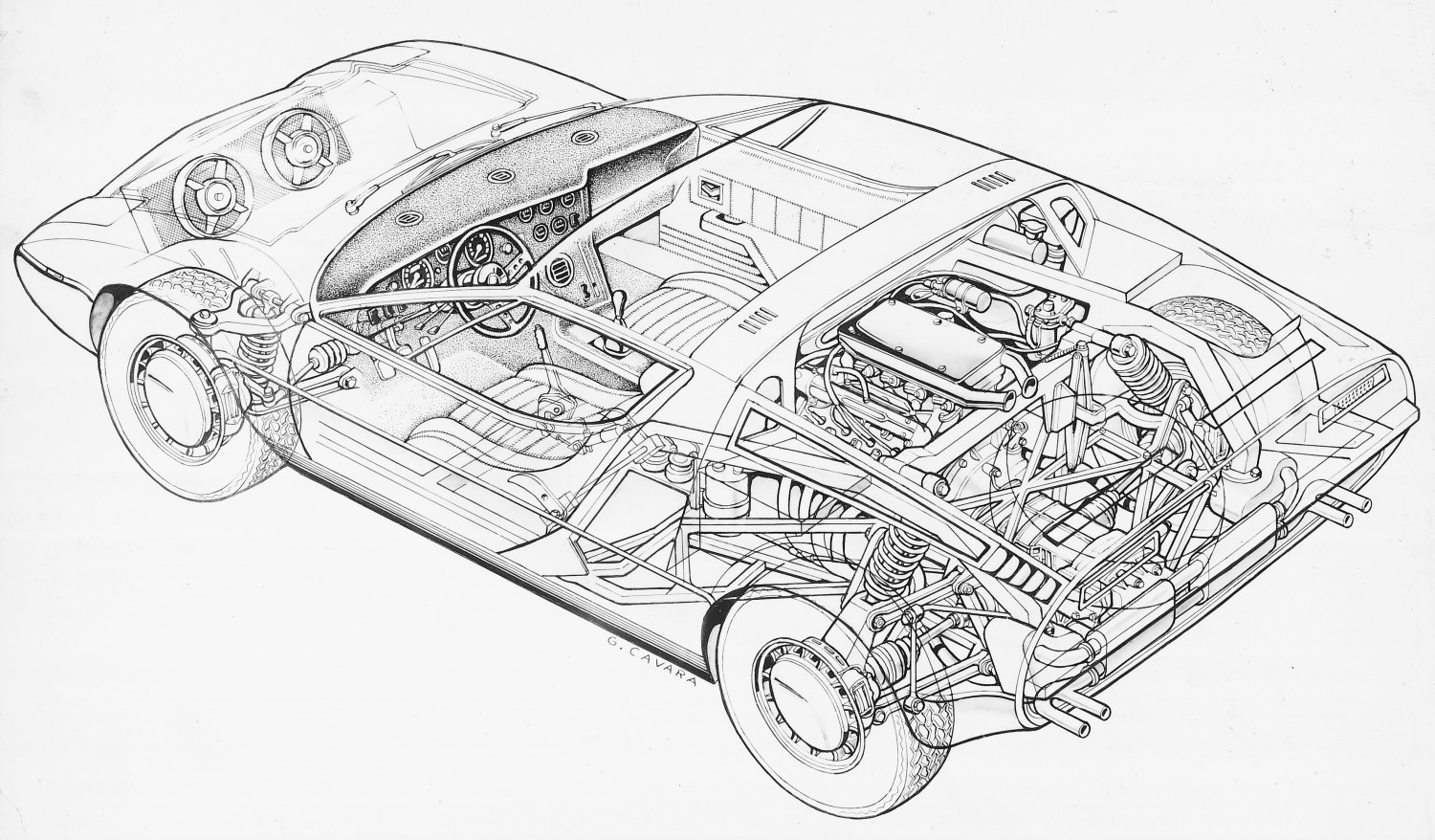
Maserati Bora 4.9 Technical Specifications
| Model | Bora 4.9 |
| Maserati internal code | Tipo AM117.49 |
| Production start | 1974 |
| Number Produced | 275 |
| Ignition | Bosch coil ignition and distributor |
| Lubrication | concentric gear pump |
| Transmission | ZF 5-speed + reverse synchromesh, rear wheel drive, single dry plate clutch, self-locking differential |
| Reduction | 1:3.77 |
| Gear ratios | I=2,58; II=1,52; III=1,04; IV=0,846; V=0,74; R=2,86 |
| Chassis | self-supporting body/chassis |
| Front suspension | transversal deformable four-side with coil springs, telescopic shock absorbers and stabilizer bar |
| Rear suspension | coil springs, telescopic shock absorbers and stabilizer bar |
| Brakes | dual hydraulic high pressure circuit, second mechanical system on rear disks for parking |
| Brakes front | 280 mm ventilated disks |
| Brakes rear | 280 mm ventilated disks |
| Steering | rack and pinion with dampers |
| Cooling system | water cooled via a centrifugal pump and two electrically-driven fans |
| Length | 170 inches (4,335 mm) |
| Width | 69.6 inches (1.768 mm) |
| Height | 44.6 inches (1,134 mm) |
| Wheelbase | 102.3 inches (2,600 mm) |
| Front track | 58 inches (1,474 mm) |
| Rear track | 56.9 inches (1,447 mm) |
| Dry weight | 3,549 lbs (1,610 Kg) |
| Curb weight | 4,034 lbs (1,830 Kg) |
| Tires front | 205/70 VR 15 Michelin as standard, Pirelli radial on request |
| Tires rear | 215/70 VR 15 Michelin as standard, Pirelli radial on request |
| Wheels | 7 ½ / 15 |
| Top speed | 177 mph (285 kmh) |
| Bodywork | 2-door 2-seater mid-engine coupé |
| Fuel tank | 19.5 Imperial gallon / 25 US gallon (90 liters) |
| Range | 400/500 km (320/400 miles) |
| Production dates | 1974-1978 |
| Engine | 90° V8, mounted longitudinally amidships |
| Bore and stroke | 93.9×89 mm |
| Total displacement | 4,930 cc |
| Displacements (unitary) | 616.25 cc |
| Compression ratio | 8.5:1 |
| Maximum power | 330 bhp at 5,500 rpm |
| Maximum torque | 49 Kgm at 4,000 rpm (355.5 lbs/ft) |
| Timing gear | two valves per cylinder, twin overhead camshafts per cylinder bank |
| Fuel feed | naturally aspirated, four Weber 42 DCNF carburetors |
| Fuel & lubricant | N.O 90/100 RM |

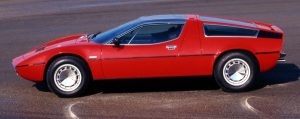
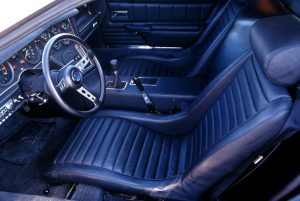
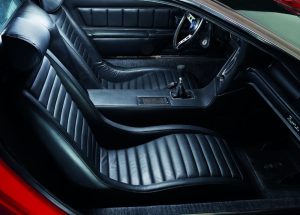
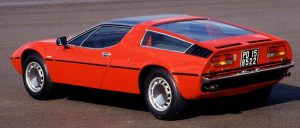
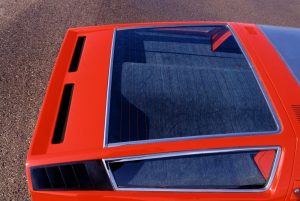
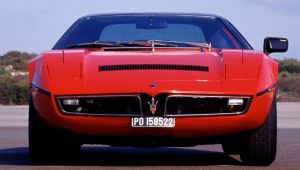
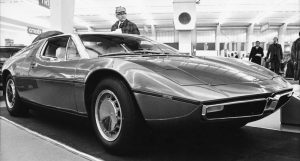
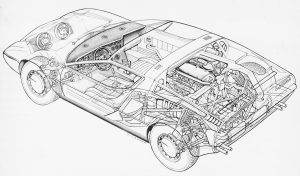
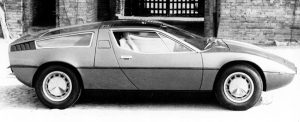
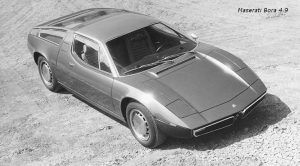
You must be logged in to post a comment.